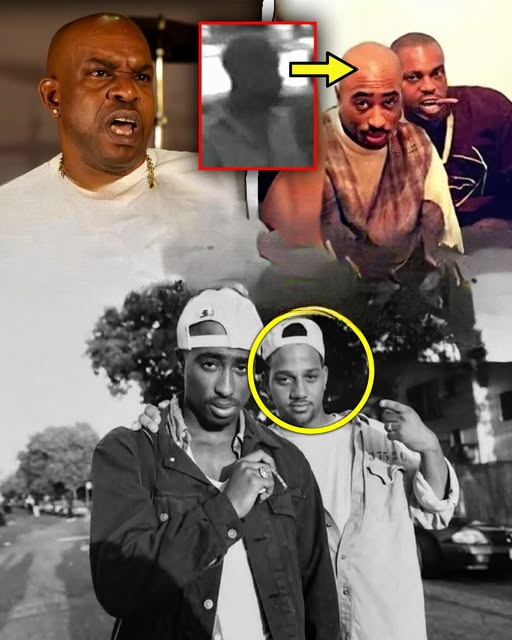For decades, Tupac Shakur’s 1996 murder has been one of the most enduring mysteries in hip-hop history. Rumors of cover-ups, secret recordings, and shadowy rivalries have circulated for years, fueling fascination and speculation. Now, nearly three decades later, Mopreme Shakur, Tupac’s older brother, has stepped forward to reveal details that promise to reignite conversations about one of music’s most tragic chapters.
In a recently leaked interview, Mopreme claims he received a phone call that, if true, could change the narrative surrounding Tupac’s death — and shine new light on figures like Sean “Diddy” Combs, who has long faced scrutiny and legal challenges.
The Leaked Phone Call
According to insiders close to the Shakur family, Mopreme’s interview was recorded in private, under conditions meant to preserve sensitive details. During the session, he allegedly dialed a number, and what followed has stunned fans and journalists alike.
“He sounded calm, collected… alive,” an insider reported. Mopreme did not appear fazed, recounting the exchange as though speaking of an event from yesterday rather than decades ago.
While the original footage has yet to be widely released, snippets of the conversation have circulated among media outlets. In the clips, Mopreme whispers, carefully revealing what he claims are long-held secrets and hidden truths.
This revelation has led to a renewed surge of speculation about the events leading to Tupac’s death, including possible connections to rivalries in the music industry, gang activity, and previously undisclosed threats.
Diddy’s Legal Struggles
Over the past few years, Sean “Diddy” Combs has faced increased legal scrutiny. Multiple court documents cite his name in various capacities, ranging from financial dealings to alleged associations with violent incidents.
Recently, federal indictments have cast an even brighter spotlight on the music mogul. Prosecutors have alleged involvement in schemes that stretch beyond music industry rivalries, including accusations related to coercion and trafficking. Diddy has denied wrongdoing, but mounting evidence and media attention have intensified the public’s interest in his activities.
While Mopreme’s claims do not constitute legal proof, they have added a layer of intrigue. Allegations of connections between Tupac’s death and business rivalries in the 1990s have resurfaced, prompting renewed attention from both fans and law enforcement observers.
A Family’s Fight for Answers
The Shakur family has long sought clarity regarding Tupac’s final years. Hiring high-profile attorney Alex Spiro, known for representing celebrities and high-profile clients in complex legal cases, the family is pursuing access to records, exploring wrongful death claims, and seeking a fuller understanding of past events.
Mopreme’s interview underscores the family’s belief that critical information has been withheld or obscured over time. While conspiracy theories abound, the family’s approach emphasizes legal channels and documentation, aiming to uncover facts rather than rely solely on rumor.
Revisiting Tupac’s Legacy
Tupac’s influence on music, culture, and social commentary remains unmatched. His work reflected the struggles of urban communities, systemic injustices, and the challenges of fame. The ongoing interest in his life and death speaks not only to his artistic impact but also to the unresolved questions that surround him.
The leaked interview and Mopreme’s statements have prompted renewed analysis of Tupac’s final recordings, lyrics, and public appearances. Fans and scholars alike are studying albums such as Makaveli: The Don Killuminati, which contain cryptic references and themes that some interpret as foreshadowing the events of 1996.
The Broader Context of 1990s Hip-Hop
The mid-1990s were a turbulent time for the hip-hop community. East Coast–West Coast rivalries, gang affiliations, and music label disputes often intersected, creating volatile environments for artists. Tupac and his contemporaries navigated these challenges while producing some of the most enduring music in history.
Figures like Suge Knight, Diddy, and others operated within complex networks of influence and conflict, sometimes blending business with personal rivalries. This context helps explain why new claims and interviews — such as Mopreme’s — resonate so strongly today.
Media and Public Reactions
News outlets quickly picked up the story, framing Mopreme’s revelations as a dramatic development in a decades-old mystery. Social media platforms saw renewed discussion, with hashtags referencing Tupac, Diddy, and unresolved questions about the 1990s hip-hop scene trending worldwide.
Fans expressed a mixture of excitement, skepticism, and concern. While some hailed Mopreme as a courageous witness, others questioned the veracity of the claims, noting that decades of speculation have often been fueled by incomplete information and rumor.
Moving Forward
As legal proceedings involving Diddy and other figures continue, Mopreme’s statements serve as a reminder of the enduring impact of Tupac’s life and death. Whether the phone call described in the interview will influence court cases or remain a sensational anecdote, it has undeniably reignited global interest in one of music history’s most enduring mysteries.
For the Shakur family, the pursuit of truth is ongoing. Mopreme’s willingness to speak publicly demonstrates a commitment to transparency and accountability, even in the face of decades of secrecy and speculation.
Tupac’s Lasting Influence
Beyond the intrigue and legal disputes, Tupac’s legacy continues to inspire new generations of artists, activists, and fans. His lyrics, interviews, and cultural commentary remain relevant, reminding the world that his voice — and the questions surrounding it — will never be fully silenced.
As the Shakur family pushes forward with legal inquiries and public advocacy, the world watches, eager for answers while honoring the enduring artistry of one of hip-hop’s greatest figures.
